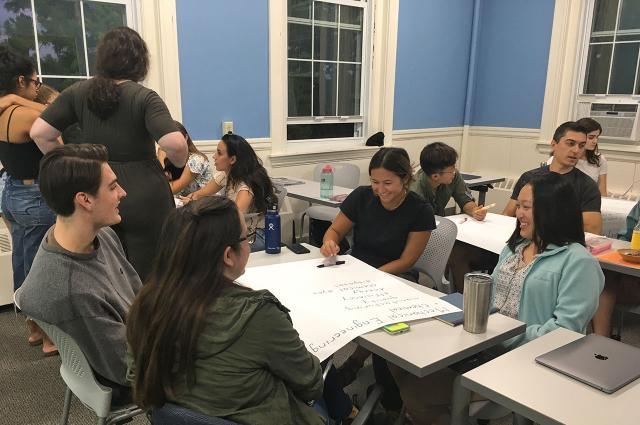#Outfitoftheday: Clothing, Sustainability, and the Implications of Getting Dressed

Students grouped themselves by majors and brainstormed how their perspectives and skills add to the topic of sustainable clothing. For example, international relations students brought a policy perspective, while the engineers looked more at technological processes and solutions. Photograph provided by Ariel Kraten
In the Fall 2019 ExCollege course, #Outfitoftheday: Clothing, Sustainability, and the Global Implications of Getting Dressed, undergraduates discover that the stories behind clothing we purchase are complex and have a greater impact on the environment than we may initially think.
Visiting Lecturer Ariel Kraten has a passion for teaching others about environmental justice. Her interest in sustainability began when she spent time in the Peace Corps and was tasked with helping an Amazonian village gain access to clean drinking water. Kraten believed that with her background and investment in clean water, she would move on to sustainability in the food industry. However, after a move to the Netherlands, she discovered “the impact of the fashion industry in terms of chemical use, water pollution, greenhouse gas emissions, and of course human rights."
With an extensive knowledge of the true nature of the fashion industry, Kraten felt a desire to shed light on how the life of your t-shirt can be detrimental to the world we live in. “The thing that excites me most about my job is teaching people in the industry the impact of their decisions," Kraten stated. Working in the fashion industry, she realized the lack of understanding many people had when it came to the sustainability of their products.
In an effort to implement more environmentally conscious manufacturing in everyday products, Kraten teaches her ExCollege course to connect with tomorrow’s innovators and leaders. She’s contributing to the sustainable clothing revolution by "reaching young people early on, before their careers take off, and giving them opportunities to practice thinking in a different way." Clothing is universal and students can connect with it on numerous levels – whether through science, business and marketing, or the creative medium that is fashion.
The class covers a variety of topics during the semester, ranging from the basics of how clothes are made to the technology and footprint of clothing manufacturing. The course intends to "examine some of the power dynamics and agendas of the various stakeholders involved, from governments to businesses to factory workers to NGOs." In the first few weeks of the semester, students have already explored serious and challenging questions, such as “who is held accountable for socially and environmentally responsible production practices?” Kraten also plans to bring in guest speakers from a range of backgrounds and experiences in the clothing industry.
In light of the global climate strike on Friday, September 20th, #Outfitoftheday seems to be one of the most relevant ExCollege courses for our generation. Given how frequently we shop and discard of clothing, it’s extremely pertinent to understand exactly what that means. In a time when clothing is affordable and accessible, and climate change is quickly causing irreversible damage to the Earth, a serious examination of our consumption practices is more important than ever.
About the Author:
Grace Prendergast is a first-year student from Evanston, Illinois, studying Biology. She enjoys reading, listening to music, and hanging out with friends in her free time.